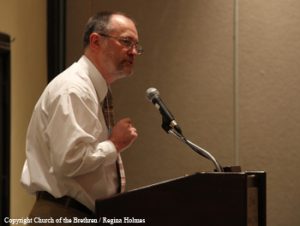By Frank Ramirez

Philip Gulley speaks for Voices for an Open Spirit (VOS) dinner on Saturday evening, July 2, at the 2011 Annual Conference.
“Justice should not have to wait until some people die. The dogmas of our quiet past are inadequate. It is time to think anew. It is time to act anew, lest God say to us what God said to our ancestors–what took you so long?”
Speaking to laughter and smiles at the Voices for an Open Spirit (VOS) dinner Saturday evening, author and storyteller Philip Gulley, pastor of the Friends Meeting in Fairfield, Ind., expressed appreciation for Gerald Ford, whose museum is within walking distance of the venue where he spoke.
“That poor man didn’t stand a chance. He was accused of pardoning Richard Nixon in order to become president. A lot of historians attribute his loss to Jimmy Carter in 1976 to his pardoning of Nixon. I’m inclined to thinking highly of anyone who forgives Quakers,” he added, alluding to the religious background he shares with the late president.
He recalled then watching Nixon’s resignation when he was 13, and how the young woman who eventually became his wife never saw it, because her family lived in a remote valley without television reception. The two Gulleys must now travel to a neighbor’s house if they want to watch television because they don’t own one. It took a four-year old to demonstrate how 3-D television works.
The thought of the new replacing the old, Gulley said, “reminded me of when I was a kid in Danville and would go to the library on Saturday mornings when it would be raining. And I would look at pictures through a stereoscope.” Those 3-D devices were once very popular, but they disappeared with the advent of movies.
“The new replaces the old. It’s kind of an inviolate rule, no matter how uncomfortable it makes us.” This led him to call to mind the words of Abraham Lincoln, writing to congress a month before the signed the Emancipation Proclamation: “The dogmas of the quiet past are inadequate to the stormy present. The occasion is piled high with difficulty and we must rise with the occasion. As our case is new, so we must think anew, and act anew.”
Gulley went on to say, “It is kind of difficult to know when we can rely on the dogmas of the quiet past and when the time has come to think anew. This is especially true of religion. Our fondness for life in the past compromises our ability to live in the present and forge the future. We resist new light.”
Gulley thought of a phrase often used in his tradition, when those who were pioneers were told, “You are walking ahead of your guide,” or “You have gone beyond your light.” Yet those pioneers, Gulley said, were later proved correct. “They had not gone beyond their guide. The majority had lagged behind their guide.”
He made comparisons both to Exodus, where the people lagged behind the pillar of fire and cloud that led them by night and day, and with the famous letter of Martin Luther king from the Birmingham Jail. In April of 1962 a newspaper published a letter by eight local religious leaders titled a “A Call To Unity,” taking King to task for leading marches for civil rights.
He then concluded, “The church’s problem is not that we have gone beyond our guide. We have lagged too far behind our guide. …The idea that we can outrun God should be recognized as the lie it is. It implies that we can outrun the God who is always before us, beckoning to us, towards a land we have only reluctantly entered. Not once has God ever said slow down to someone pioneering the moral landscape. “
Gulley is the author of several books, including the Front Porch tales, the Harmony series, If the Church were Christian, The Evolution of Faith: How God is Creating a Better Christianity, and is the co-author of
During her introduction of the speaker, Nancy Mullen Faus meant to say that Philip Gulley had appeared regularly on PBS until the budget cut. Unfortunately, she said, “until the cudget butt.” After the laughter died down Gulley first said, “Haven’t heard that many words spoken about me since last month when the minister was sick and I had to introduce myself.” He then paused and added, “Like you, I hate those cudget butts too.”